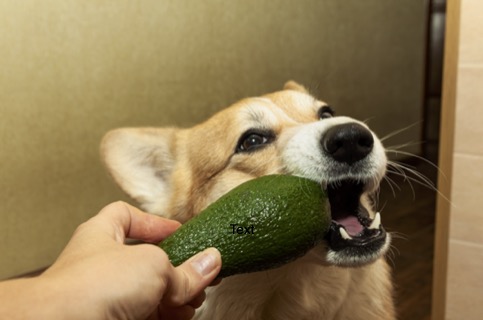Avocado, a popular and nutritious fruit enjoyed by many, is often incorporated into various dishes and recipes. While it offers numerous health benefits for humans, it poses potential dangers to these pets. In this article, we will explore why avocados are harmful to dogs, the potential consequences of avocado ingestion, safe consumption guidelines, symptoms of avocado poisoning, and when to seek veterinary assistance.

What Makes Avocado Dangerous for Dogs?
Persin is a naturally occurring fungicidal toxin found in avocados and avocado oil. While it is generally harmless to humans, it can have adverse effects on certain animals, including dogs1. Persin is most concentrated in the avocado pit, skin, and leaves, but it is present in smaller amounts in the fruit’s flesh. The level of persin toxicity varies among different animal species, with dogs generally being more resistant compared to other animals such as birds and small mammals. However, it’s important to note that individual sensitivity to persin can vary, and dogs may still experience severe reactions if they consume significant amounts of avocado or parts of the plant.
Persin can disrupt the normal functioning of cell membranes, leading to cellular damage and potentially affecting various organs. While the exact mechanisms of persin toxicity in dogs are not fully understood, it is best to be cautious and avoid feeding avocados or any avocado-containing products to dogs to prevent potential health risks.
Safe Amount of Avocado for Dogs
While avocados are generally not recommended for dogs, small amounts of ripe avocado flesh are unlikely to cause harm. However, moderation is key, and it is important to be aware if it is consumed, as well as the quantity that was eaten.
The Overlooked Danger: the Avocado Pit
The avocado pit, or seed, poses additional risks if ingested by a dog. The pit is toxic, as it contains a high level of persin. Additionally, the pit is a significant danger to dogs due to its size and shape. If a dog swallows the pit, it can cause an intestinal blockage, leading to severe complications. The pit is large and indigestible, increasing the risk of obstruction within the gastrointestinal tract. Therefore, it is crucial to prevent dogs from accessing avocado pits to avoid potential harm.
Symptoms of Avocado Poisoning in Your Dog
While most cases of avocado poisoning in dogs result in mild symptoms, it is important to be aware of potential severe reactions that may occur, even if they are uncommon. The following symptoms range from mild to severe, with the last two being extreme cases that require immediate medical attention.
- Vomiting: Dogs may experience episodes of vomiting after ingesting avocado. This can occur within a few hours or up to a day after consumption.
- Diarrhea: Avocado ingestion can lead to diarrhea in dogs, causing loose or watery stools. It is important to monitor the frequency and consistency of your dog’s bowel movements.
- Abdominal Pain and Pancreatitis: Dogs may exhibit signs of abdominal discomfort, such as whining, restlessness, or a hunched posture. This can indicate inflammation or irritation in the gastrointestinal tract or the inflammation of the pancreas.
- Loss of Appetite: Avocado poisoning can result in a decreased desire to eat or a complete loss of appetite. If your dog shows a sudden disinterest in food, it could be a symptom of avocado toxicity.
- Excessive Drooling: Dogs may drool excessively as a result of avocado ingestion. Increased saliva production can be a sign of gastrointestinal upset.
- Difficulty Swallowing: Avocado poisoning may cause difficulty swallowing or discomfort while eating or drinking. This can be a concerning symptom that warrants veterinary attention if it persists.
- Lethargy: Avocado toxicity can lead to a general lack of energy or excessive tiredness in dogs. If your dog appears unusually lethargic or uninterested in activities, it could be a symptom of avocado poisoning.
- Tremors: In some cases, dogs may experience involuntary muscle tremors or shaking. This can be a sign of a more severe reaction to avocado ingestion and should be evaluated by a veterinarian.
- Difficulty Breathing: In rare and severe cases, avocado ingestion may cause difficulty breathing or shortness of breath. This is a serious symptom that requires immediate veterinary care.
When Medical Attention is Required
If your dog exhibits prolonged symptoms of avocado poisoning or if you suspect they have consumed a significant amount of avocado, it is essential to contact your veterinarian immediately. The veterinarian can provide guidance on the best course of action, recommend appropriate treatment, and monitor your dog’s condition. Quick intervention can help prevent complications and ensure your dog receives the necessary care.
What to Remember About Dogs and Avocados
Persin is what makes avocados a potential hazard to dogs and is mainly concentrated in the skin, and leaves. If a dog has a little big of guacamole or ingests avocado, it can lead to various health issues such as gastrointestinal upset, pancreatitis, and the potential for an intestinal blockage if the pit is swallowed. While small amounts of ripe avocado flesh may be considered safe as an occasional treat, it is recommended to consult with a veterinarian for guidance. Symptoms of avocado poisoning in dogs include vomiting, diarrhea, abdominal pain, and lethargy. If you observe any of these signs in your dog continually or notice severe symptoms, it is crucial to seek veterinary assistance promptly for an accurate diagnosis and appropriate treatment.
As responsible dog owners, it is essential to be aware of the potential dangers certain foods can pose to our furry companions. By understanding the risks associated with avocados and being vigilant about our dog’s well-being, we can help keep them safe and healthy.
Citations
Putative avocado toxicity in two dogs, (1994).
http://hdl.handle.net/2263/33074
Frequently Asked Questions
-
Avocados are generally not considered safe for dogs to eat. While small amounts of ripe avocado flesh may be tolerated by some dogs, it is best to be cautious and avoid feeding avocados to your pet due to the potential risks associated with persin, a toxic compound present in avocados.
-
Medical attention is not always needed for mild symptoms of avocado poisoning in dogs, such as mild gastrointestinal upset. However, if your dog exhibits severe symptoms like difficulty breathing or tremors, or if you suspect they have ingested a significant amount of avocado or the pit, it is crucial to seek immediate veterinary attention. Prompt medical care can help address any potential complications and ensure the well-being of your dog.
-
The pit, skin, and leaves of the avocado contain the highest concentrations of persin, making them the most dangerous parts for dogs. While the flesh of the avocado also contains persin, the levels are significantly lower. It is important to prevent dogs from accessing any part of the avocado plant, especially the pit, to minimize the risk of toxicity and potential hazards, such as intestinal blockage.




